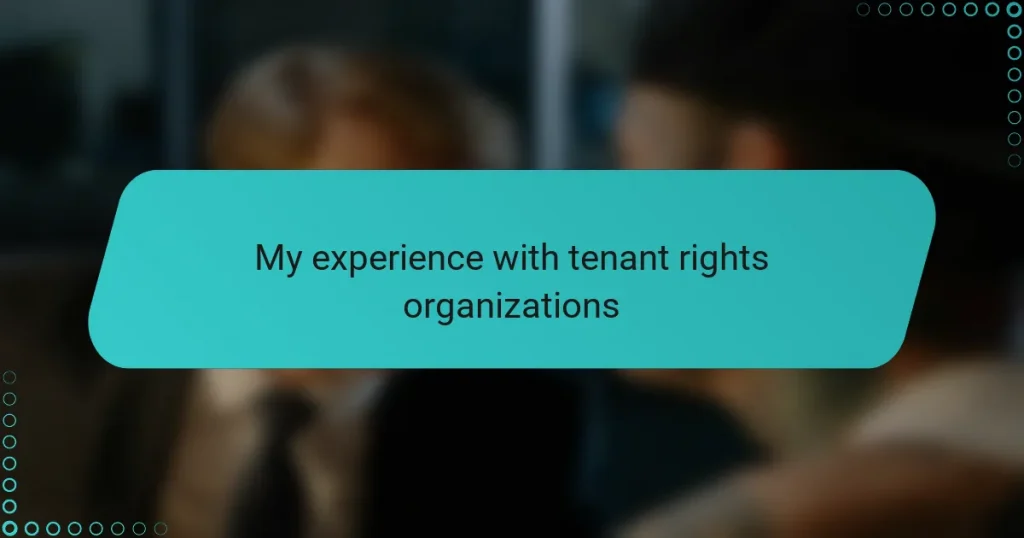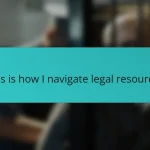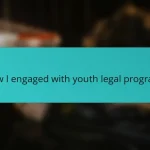Key takeaways
- Tenant rights organizations provide essential support and education to empower renters facing challenges such as evictions or lease issues.
- Legal advocacy helps simplify complex housing laws, ensuring tenants understand their rights and feel confident in asserting them.
- Joining tenant rights groups fosters community and connection, offering resources and a louder collective voice in the fight for fair housing.
- Facing legal hurdles can be slow and frustrating, but persistence and knowledge gained from advocates can lead to meaningful change.
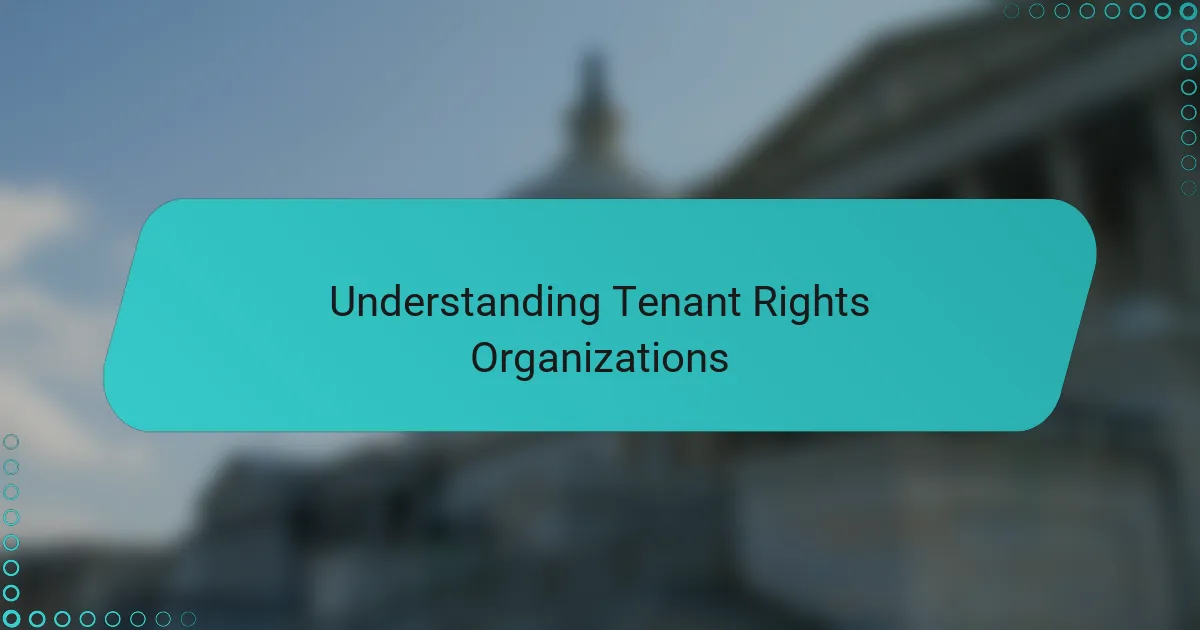
Understanding Tenant Rights Organizations
Tenant rights organizations are more than just legal help centers; they are advocates that stand with renters facing unfair treatment. From my experience, these groups serve as an essential bridge between complex laws and everyday struggles, making rights understandable and accessible.
Have you ever felt overwhelmed trying to decipher a lease or fighting an eviction notice alone? I certainly have, and turning to a tenant rights organization felt like finding an ally who genuinely cared and guided me step-by-step through the process.
What strikes me most about these organizations is their passion to empower tenants, not just win cases. They offer education, support, and a sense of community, which can transform a frightening situation into one where you feel heard and backed every step of the way.
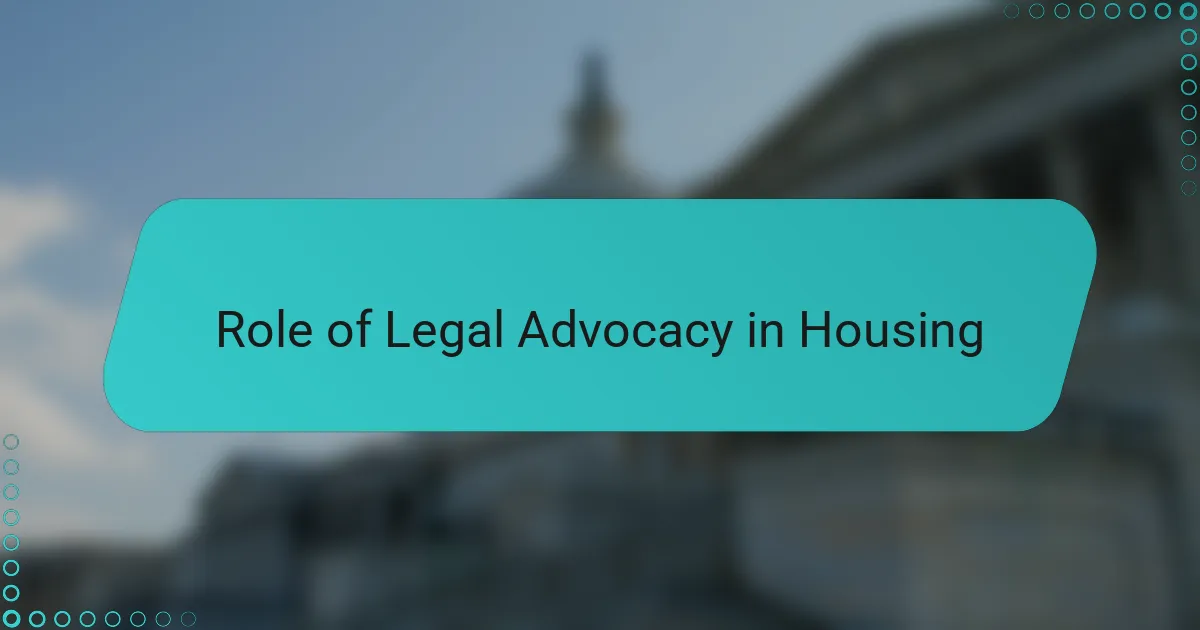
Role of Legal Advocacy in Housing
Legal advocacy plays a crucial role in housing by leveling the playing field for tenants who often feel powerless against landlords or confusing legal jargon. From my experience, having an advocate by my side turned what seemed like an impossible fight into a manageable challenge, giving me confidence to stand up for my rights.
Have you ever wondered how many renters give up simply because they don’t understand their legal options? Legal advocates break down those barriers, turning complicated laws into clear, actionable steps that anyone can follow, which is something I deeply appreciate.
What really stuck with me was how legal advocacy doesn’t just protect tenants in the moment but also pushes for systemic change. Knowing that these organizations aren’t just fighting individual battles but working to improve the entire housing system gave me a sense of hope and belonging I hadn’t expected.
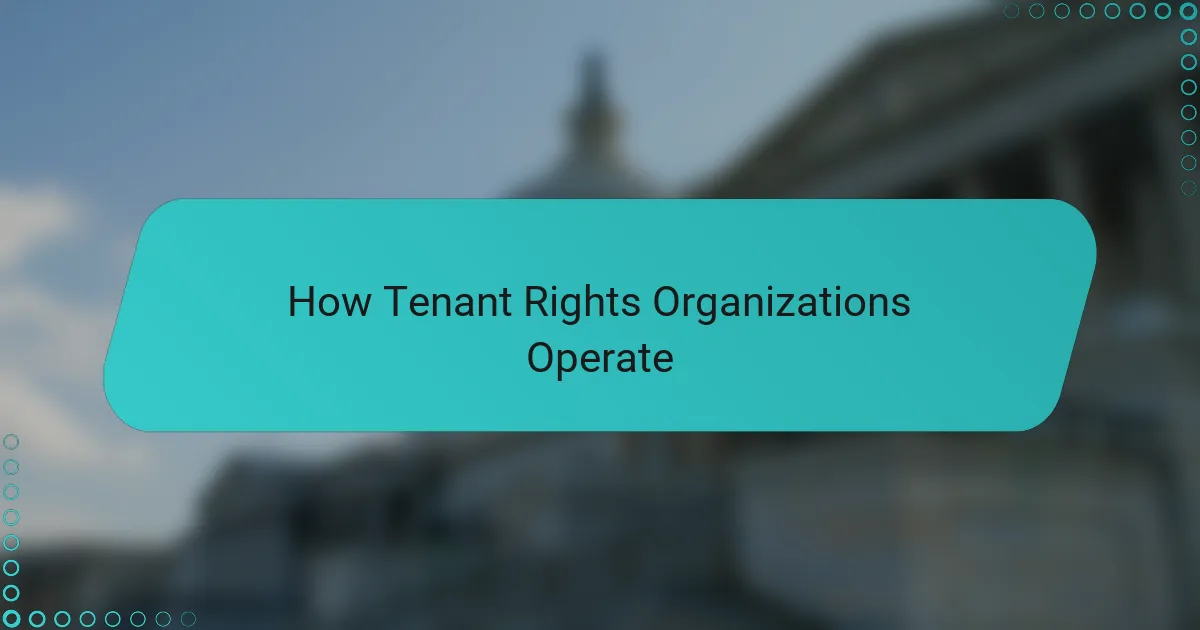
How Tenant Rights Organizations Operate
What I found fascinating about tenant rights organizations is how they operate on multiple levels at once. They don’t just provide legal advice; they organize workshops, community meetings, and one-on-one consultations. This multi-pronged approach ensures that no tenant feels isolated or uninformed, which was exactly what I needed when navigating my own housing issues.
Have you ever walked into an office where people immediately listen and offer practical solutions instead of jargon? That’s how these organizations function—they break down complex laws into simple steps you can actually follow. I remember feeling a rush of relief when a volunteer patiently explained my lease terms in everyday language, which made all the difference.
Behind the scenes, these groups also work tirelessly to monitor local policies and advocate for tenant-friendly legislation. It’s not just about solving your case today; it’s about changing the rules so future renters don’t end up in the same tough spot. Knowing this ongoing effort gave me a deeper respect for how thoughtfully these organizations operate.
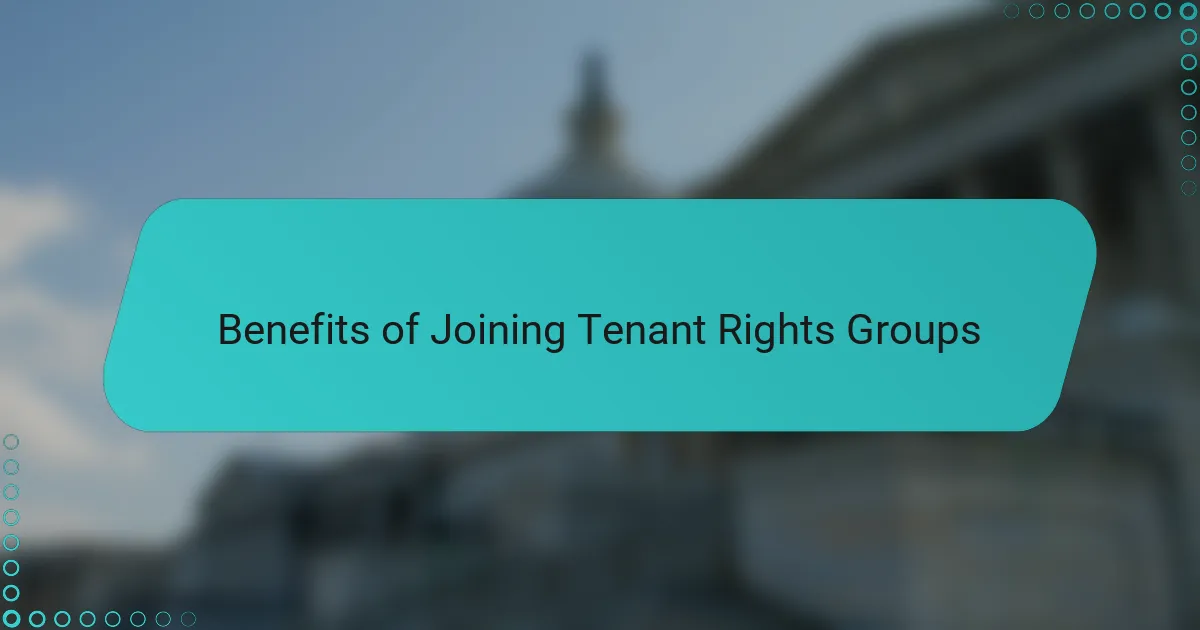
Benefits of Joining Tenant Rights Groups
Joining tenant rights groups brought me a sense of belonging I hadn’t expected. I remember feeling overwhelmed and isolated before, but connecting with others facing similar struggles made me realize I wasn’t alone. Have you ever noticed how simply sharing your story can lift a heavy weight? That community support is truly empowering.
Another benefit I valued deeply was the direct access to expert advice. When I faced a tricky lease renewal, the guidance from the group helped me avoid costly mistakes. It felt reassuring to have knowledgeable advocates break down complex legal terms into clear, actionable steps that I could actually follow without second-guessing myself.
Perhaps most importantly, being part of these groups gave me a louder voice in the fight for fair housing. Instead of feeling powerless, I felt like an agent of change alongside others. Knowing that our collective efforts could influence policies was incredibly motivating—don’t you want to be part of something bigger than your own case?
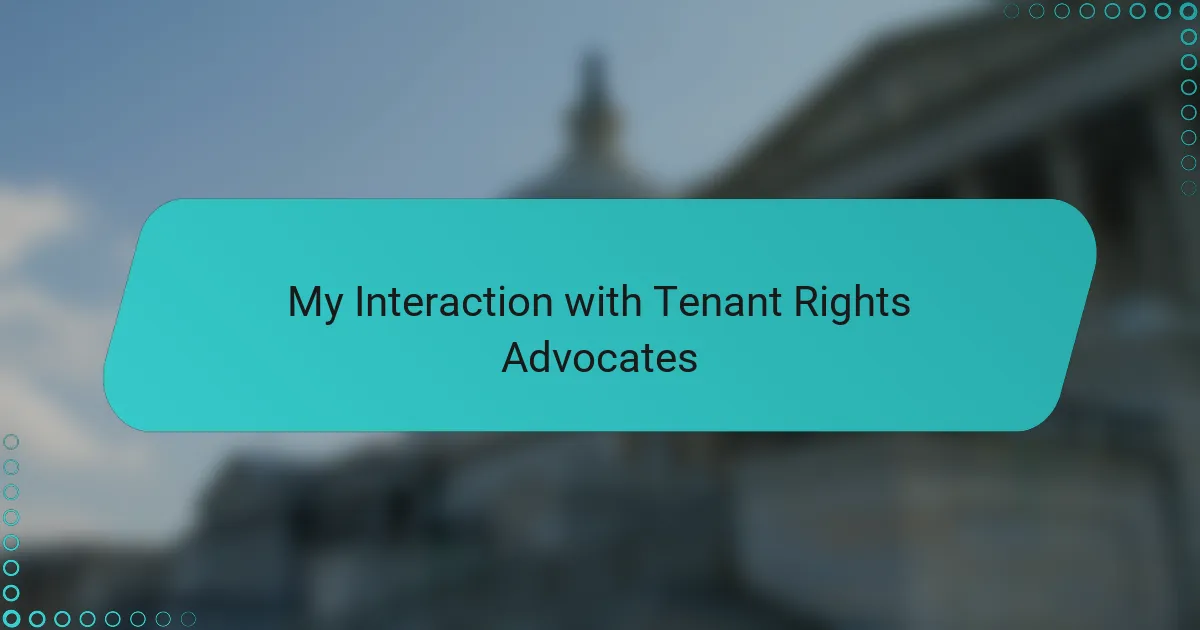
My Interaction with Tenant Rights Advocates
When I first reached out to tenant rights advocates, I wasn’t sure what to expect. But what stood out immediately was their genuine willingness to listen—no judgment, just real concern for my situation. Have you ever experienced that relief when someone actually hears you? That moment made me feel seen and understood.
One particular advocate took the time to walk me through each step of challenging an unlawful rent increase. Their calm explanations turned my anxiety into action, and I realized I wasn’t battling this alone. It’s amazing how having just one knowledgeable person in your corner can change the entire dynamic.
Sometimes, our conversations extended beyond legal advice, touching on how these struggles affect my daily life and mental health. I hadn’t expected such empathy from a legal advocate, but their support reminded me that tenant rights work isn’t just about laws—it’s about people. Doesn’t it make a world of difference when advocates treat you like more than just a case number?
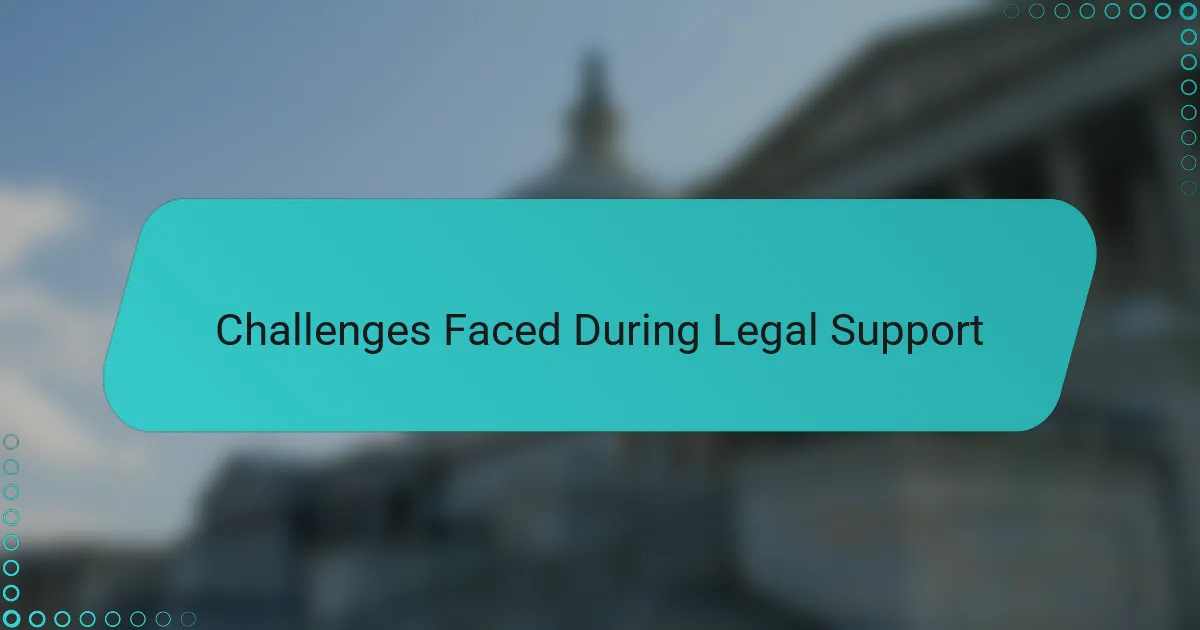
Challenges Faced During Legal Support
Navigating legal support through tenant rights organizations wasn’t without its hurdles. I often found myself frustrated by how slow the process could be—waiting weeks for responses or updates sometimes made me question if the fight was worth it. Have you ever felt stuck in limbo, unsure if your advocate was still working on your case? That waiting game was emotionally draining.
Another challenge I faced was the sheer volume of cases these organizations handle. While I felt grateful for the help, there were moments when I sensed the advocates were stretched thin, juggling so many tenants needing assistance. It made me realize that despite their dedication, limited resources can impact the speed and depth of support you receive.
Lastly, I struggled with understanding some of the legal jargon used during discussions, even with advocates breaking things down. I wondered if others felt the same confusion and whether this created a barrier to fully accessing the help available. Have you ever walked away from a meeting still unsure about key details? That uncertainty can be paralyzing when your home feels at stake.
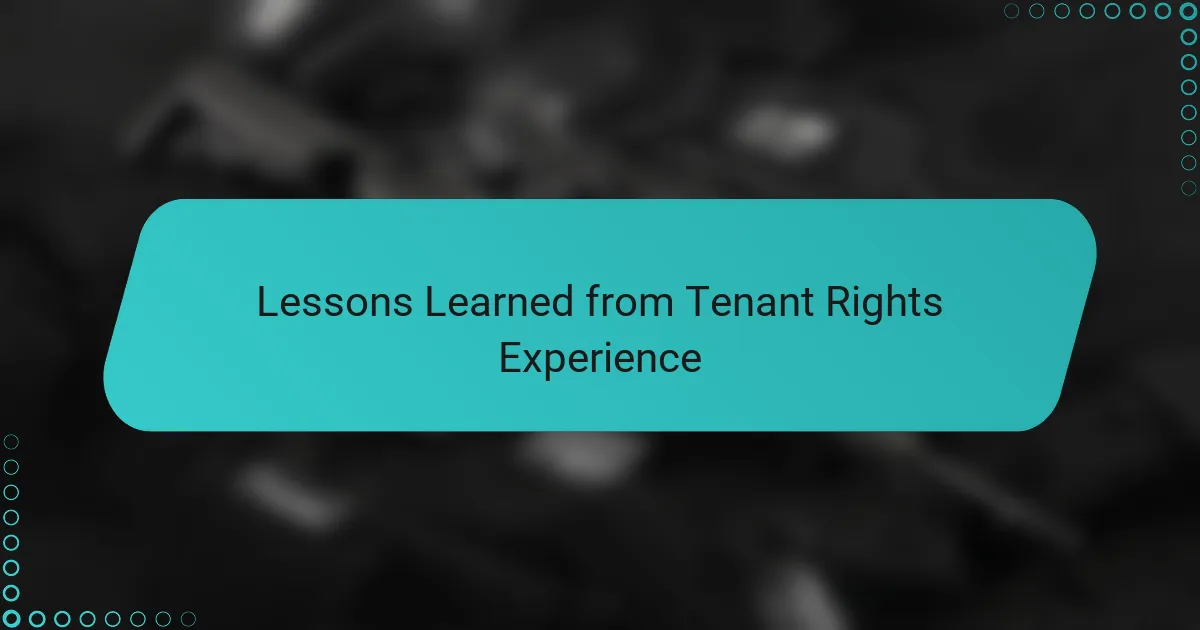
Lessons Learned from Tenant Rights Experience
One lesson I learned quickly is that knowledge is power. When I finally understood my rights clearly, it changed how I approached every conversation with my landlord. Have you ever noticed how just knowing the rules makes you feel more confident and less like you’re at someone else’s mercy? That clarity was a game changer in my tenant experience.
Another important takeaway was patience. Legal processes move slowly, and that waiting tested my resolve more than anything else. I often asked myself, “Is this fight really worth all this stress?” But leaning on tenant rights advocates reminded me that persistence can lead to real change, both personally and systemically.
Lastly, I realized how crucial community support is. Facing housing struggles alone felt isolating, but being part of a group that genuinely cared made those tough moments bearable. Isn’t it amazing how sharing your story with others who get it can lift some of the weight off your shoulders? That sense of solidarity kept me going when I wanted to give up.
